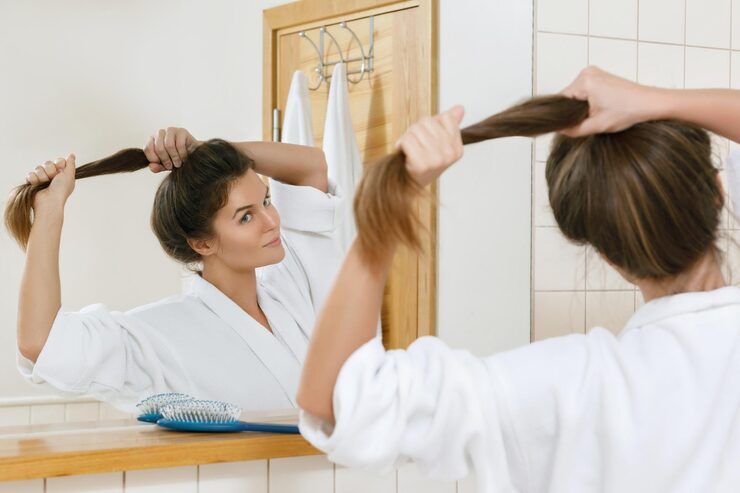Useful information and basics for stronger, naturally growing hair
Hair has always been seen as a symbol of health, identity, and confidence. Many people look for ways to improve hair strength and promote natural growth without relying heavily on synthetic treatments or procedures. The basics of stronger, naturally growing hair lie in understanding how lifestyle, nutrition, scalp health, and proper care routines work together.
This topic exists because people face common challenges like hair thinning, breakage, and slow growth, often due to stress, poor diets, pollution, or hormonal changes. Exploring natural approaches helps individuals make healthier, long-lasting changes for hair care rather than relying only on temporary fixes.

Importance
Strong and naturally growing hair matters to people of all ages and genders. For some, it boosts confidence; for others, it reflects health and self-care.
Key reasons this topic is important today:
-
Rising hair health concerns: Issues like hair fall, premature greying, and thinning are increasing globally.
-
Growing awareness of natural care: People prefer chemical-free approaches and home remedies that are safe and sustainable.
-
Well-being connection: Hair health is often linked with overall nutrition and lifestyle, making it a broader wellness concern.
Who it affects:
-
Young adults facing stress-related hair loss
-
Women experiencing postpartum or hormonal changes
-
Men dealing with male-pattern hair thinning
-
Anyone interested in natural beauty and wellness routines
Problems it solves:
-
Helps prevent dependency on chemical treatments
-
Provides sustainable hair-care solutions
-
Encourages healthier dietary and lifestyle habits
Recent Updates
The past year has seen increased focus on nutritional approaches and scalp-focused treatments for natural hair care.
-
Nutrition trend (2024–2025): Diets rich in protein, iron, omega-3 fatty acids, and vitamins B, C, and D are emphasized in medical studies for promoting hair growth.
-
Plant-based products: Herbal and plant-based oils (like rosemary, argan, and coconut) gained attention due to fewer side effects compared to chemical products.
-
Scalp microbiome research: Experts are studying how balancing good bacteria on the scalp improves natural hair strength.
-
Global wellness movement: Countries like India and Japan are promoting traditional practices such as Ayurveda and scalp massage for natural growth.
Laws or Policies
Hair care is also influenced by consumer protection regulations and product safety standards.
-
FDA (U.S.): The Food and Drug Administration monitors cosmetic labeling and ensures hair products are safe for consumer use, though it does not approve cosmetics before sale.
-
EU Cosmetics Regulation: Requires natural hair products sold in Europe to list all ingredients clearly and meet strict safety testing standards.
-
Ayush Ministry (India): Regulates Ayurvedic hair oils, herbal shampoos, and supplements to ensure authenticity.
-
Advertising rules: Many countries restrict exaggerated claims about "miracle hair growth" to protect consumers from misleading information.
Such policies ensure that individuals seeking natural hair solutions get products and advice that are transparent, safe, and backed by proper testing.
Tools and Resources
A range of tools and resources can support stronger, naturally growing hair:
-
Hair tracking apps:
-
Hair Journal – Helps track hair fall, growth patterns, and care routines.
-
SkinVision – Monitors scalp health with photo tracking.
-
-
Nutrition apps:
-
MyFitnessPal – Tracks protein, vitamins, and minerals linked to hair health.
-
Cronometer – Provides detailed nutrition breakdown to avoid deficiencies.
-
-
Online resources:
-
American Academy of Dermatology (AAD) – Educational material on natural hair health.
-
National Center for Complementary and Integrative Health (NCCIH) – Research on herbal remedies like biotin and saw palmetto.
-
-
DIY tools:
-
Wooden combs for reduced breakage
-
Scalp massagers to improve circulation
-
Natural oil applicators for even distribution
-
FAQs
Q1. What foods are best for natural hair growth?
Foods rich in protein (eggs, fish, legumes), iron (spinach, red meat), omega-3 (walnuts, salmon), and vitamins (berries, citrus, sweet potatoes) are highly beneficial.
Q2. Can natural oils really help with stronger hair?
Yes. Oils like coconut, rosemary, and argan help moisturize, reduce breakage, and improve scalp circulation, supporting healthier growth over time.
Q3. How often should I wash my hair for natural growth?
Washing 2–3 times a week is recommended to keep the scalp clean without stripping natural oils. However, frequency depends on hair type and lifestyle.
Q4. Does stress affect natural hair growth?
Yes. Chronic stress disrupts hormonal balance and can lead to hair thinning or increased shedding. Stress management practices like yoga, meditation, and exercise help.
Q5. Are supplements necessary for stronger hair?
Not always. A balanced diet often provides the needed nutrients. Supplements like biotin or vitamin D may help if you have deficiencies, but they should be taken under medical guidance.
Example Graph: Key Nutrients for Hair Growth
| Nutrient | Role in Hair Growth | Common Sources |
|---|---|---|
| Protein | Builds hair structure | Eggs, fish, beans |
| Iron | Prevents hair thinning | Spinach, red meat |
| Omega-3 fatty acids | Strengthens follicles | Salmon, walnuts |
| Vitamin C | Helps collagen production | Citrus fruits, berries |
| Vitamin D | Supports follicle cycles | Sunlight, fortified milk |
Final Thoughts
Stronger, naturally growing hair is the result of consistent care, good nutrition, and healthy lifestyle habits rather than quick fixes. Understanding the basics—balanced diets, scalp health, stress management, and safe product use—helps achieve long-lasting results. By combining natural remedies with modern tools and reliable resources, anyone can support healthier hair growth in a safe and sustainable way.
